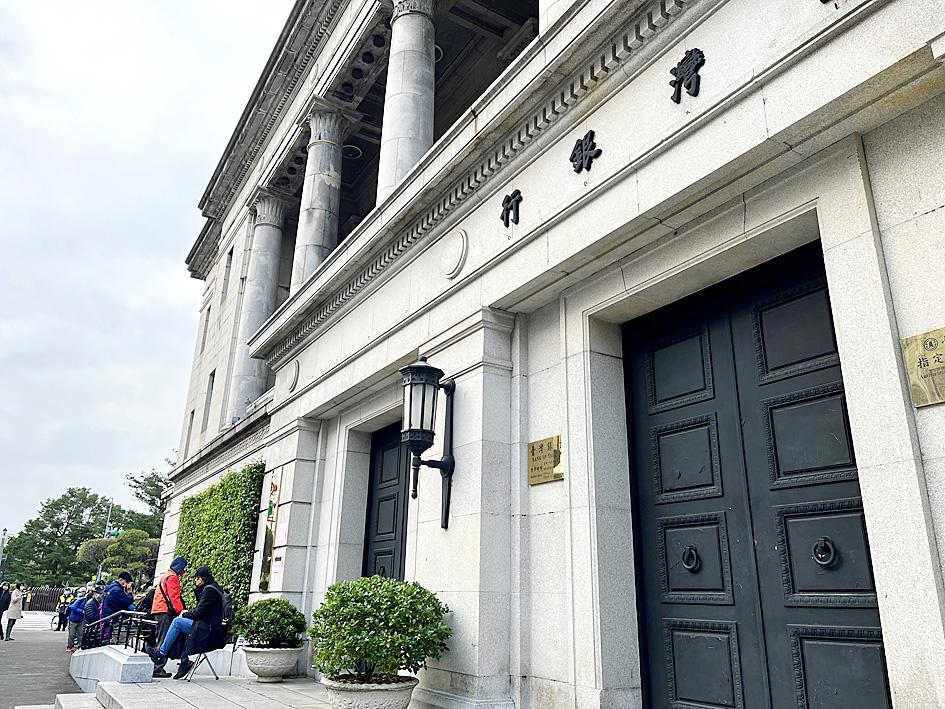Several major lenders are to raise interest rates for depositors today, after the central bank increased its benchmark rediscount rate from 1.375 percent to 1.5 percent on Thursday.
After major lenders raise their time deposit rates by 12.5 basis points, depositors who own NT$1 million (US$33,647) in time deposit accounts are to receive an additional NT$3,750 in interest annually.
State-owned Bank of Taiwan (臺灣銀行), the nation’s biggest lender, is to increase its floating rate for one-year time savings deposits by 0.125 percentage points to 1.215 percent to fully reflect the central bank’s rate adjustments.

Photo: CNA
As a result, depositors who have NT$1 million in one-year time savings accounts with the bank are to receive NT$12,150 in interest annually, it said.
The bank is also to raise its two-year time savings deposit floating rate by 0.125 percentage points to 1.25 percent, while its three-year time savings deposit floating rate is to rise 13 basis points, higher than the central bank’s hike, to 1.285 percent, it said.
State-run Land Bank of Taiwan (土地銀行) is to raise the floating and fixed rates for all of its time savings deposit accounts by 0.125 percentage points, with the floating rate for the one-year time savings deposit account reaching 1.215 percent.
Government investment lender First Commercial Bank (第一銀行) is to raise its one-year, two-year and three-year savings deposit floating rates by 0.125 percentage points to 1.215 percent, 1.395 percent and 1.395 percent respectively, effective today.
It is also to raise the fixed rates by no less than 0.145 percentage points to 1.235 percent, 1.26 percent and 1.27 percent for its one-year, two-year and three-year time savings deposits accounts respectively.
State-run Taiwan Cooperative Bank (合庫銀行) is to increase its floating rates for one-year to three-year time savings deposits and the fixed rates for its one-year to three-year time savings deposits by 0.125 percentage points.
While deposit rates are to rise in line with the central bank’s rate hikes, market observers said the banking sector would raise mortgage rates by more than 12.5 basis points soon to have a higher interest spread, which is expected to improve banks’ profitability.

Vincent Wei led fellow Singaporean farmers around an empty Malaysian plot, laying out plans for a greenhouse and rows of leafy vegetables. What he pitched was not just space for crops, but a lifeline for growers struggling to make ends meet in a city-state with high prices and little vacant land. The future agriculture hub is part of a joint special economic zone launched last year by the two neighbors, expected to cost US$123 million and produce 10,000 tonnes of fresh produce annually. It is attracting Singaporean farmers with promises of cheaper land, labor and energy just over the border.

US actor Matthew McConaughey has filed recordings of his image and voice with US patent authorities to protect them from unauthorized usage by artificial intelligence (AI) platforms, a representative said earlier this week. Several video clips and audio recordings were registered by the commercial arm of the Just Keep Livin’ Foundation, a non-profit created by the Oscar-winning actor and his wife, Camila, according to the US Patent and Trademark Office database. Many artists are increasingly concerned about the uncontrolled use of their image via generative AI since the rollout of ChatGPT and other AI-powered tools. Several US states have adopted

KEEPING UP: The acquisition of a cleanroom in Taiwan would enable Micron to increase production in a market where demand continues to outpace supply, a Micron official said Micron Technology Inc has signed a letter of intent to buy a fabrication site in Taiwan from Powerchip Semiconductor Manufacturing Corp (力積電) for US$1.8 billion to expand its production of memory chips. Micron would take control of the P5 site in Miaoli County’s Tongluo Township (銅鑼) and plans to ramp up DRAM production in phases after the transaction closes in the second quarter, the company said in a statement on Saturday. The acquisition includes an existing 12 inch fab cleanroom of 27,871m2 and would further position Micron to address growing global demand for memory solutions, the company said. Micron expects the transaction to

A proposed billionaires’ tax in California has ignited a political uproar in Silicon Valley, with tech titans threatening to leave the state while California Governor Gavin Newsom of the Democratic Party maneuvers to defeat a levy that he fears would lead to an exodus of wealth. A technology mecca, California has more billionaires than any other US state — a few hundred, by some estimates. About half its personal income tax revenue, a financial backbone in the nearly US$350 billion budget, comes from the top 1 percent of earners. A large healthcare union is attempting to place a proposal before